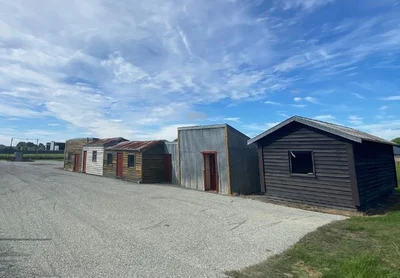Historic Chinese market garden to open as heritage park

After 16 long years, the former site of Ashburton's Chinese market garden settlement will finally open in February as a community heritage park.
Ashburton Mayor Neil Brown said it has taken years of work to restore the Ng King Brothers Chinese Market Garden Settlement.
“It’s a special moment to have an opening date after 16 years since the late Yep Ng came forward to council with the family’s vision.
“I’d like to thank the many people that have been involved in making this project come to life.
“It honours the memory of Yep Ng and the descendants of the Ng King brothers, past and present, and will be a great community asset for all to enjoy.”
Brown described the site as an “outdoor museum” where the community can learn more about the history of Chinese pioneers in Ashburton.
The market garden settlement on Allens Road operated from the early 1920s until 1964, and was the largest Chinese community in the South Island during that time.
The approximately 2.3-hectare site remains home to a group of historical buildings and facilities that have been stabilised to stop further deterioration.
A landscape plan will take several years and will include pathways, interpretive panels detailing the history of the site, sitting areas and extensive planting a council spokesperson said.
The project was born in 2008 when one of the group of owners, Yep Ng, worked with other family members to have the settlement come under council management.
A memorandum of understanding was signed in 2013, which saw the descendants of the five original settlement landowners retain ownership and handover stewardship of the site to the council so it could become a community reserve.
A working group began developing plans for the site in 2016 and the work to turn it into a heritage park began in 2019.
The site was declared an archaeologically significant site in 2019 and the following year it became a Category 1 historic place on the New Zealand Heritage List Rārangi Kōrero.
As well as a $25,000 Chinese Poll Tax grant, the council had committed $40,000 to the project that was conditional on the project receiving a $65,000 grant from Heritage New Zealand.
It only received a $50,000 grant and the council opted to fund the $15,000 shortfall in 2020 to ensure the project was completed.
The opening on February 25 is a private invite-only celebration for the descendants of the Ng King settlers and the people involved in the project over the past 16 years.
It will then be open to the public.
Century-old Chinese heritage site
The Ng King Brothers Chinese Market Garden Settlement is a rare remaining example of a 20th century Chinese market garden settlement in New Zealand.
The early Chinese settlers in Ashburton were all male, with the first women and children arriving in 1939 when three of the men were able to bring their families out to New Zealand under the war refugee scheme.
The community settlement grew and at its peak during the late 1940s and 1950s there were around 12 houses and as many as 80 people living on the site.
As it grew, its purpose changed from a small hub for single men who operated the market garden business, to a vibrant small community settlement with multiple families and a wide range of functions, making it almost entirely self-sustainable.
Towards the late 1950s, families began to disperse and the numbers living and working in the settlement declined.
The market garden and on-site shop at Allens Road were closed in 1964, and Yep Ng and his brothers retained the King Brothers fruit shop on Burnett Street, which kept trading until 2006.
Over time, the buildings fell into disrepair and a number of the ancillary buildings were lost but the core of the settlement remains standing.
The site is home to one of the last remaining original Chinese pig pit ovens in Australasia, which was restored in 2013 with funding from the Chinese Poll Tax Heritage Trust.
The remaining buildings have been stabilised to form a focal point of the community heritage park.
Heritage New Zealand Pouhere Taonga describes the site as “a significant reminder of a once flourishing business, the Chinese immigrants that drove it, and the important contribution they made to the Ashburton and wider Canterbury community”.
By Jonathan Leask

